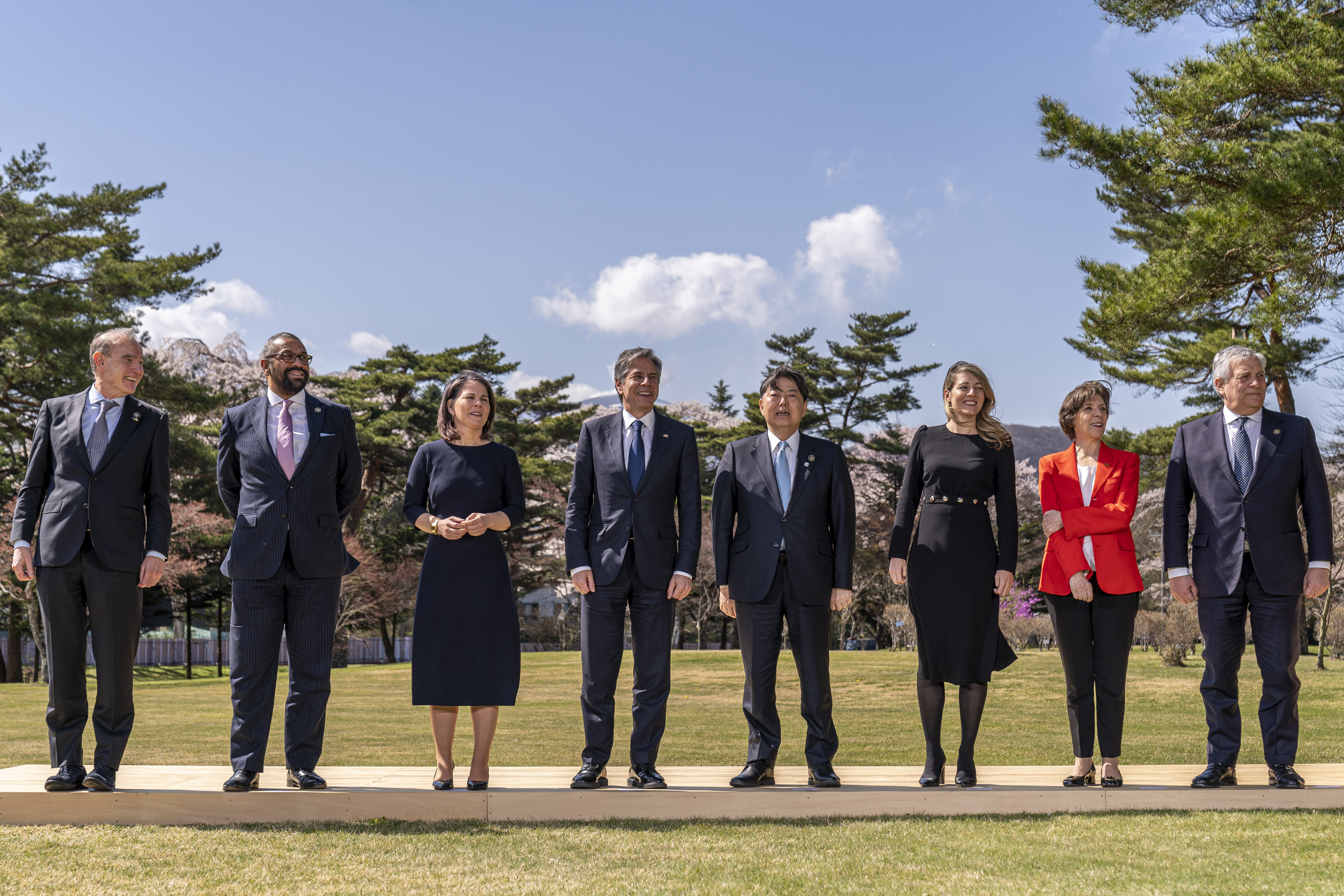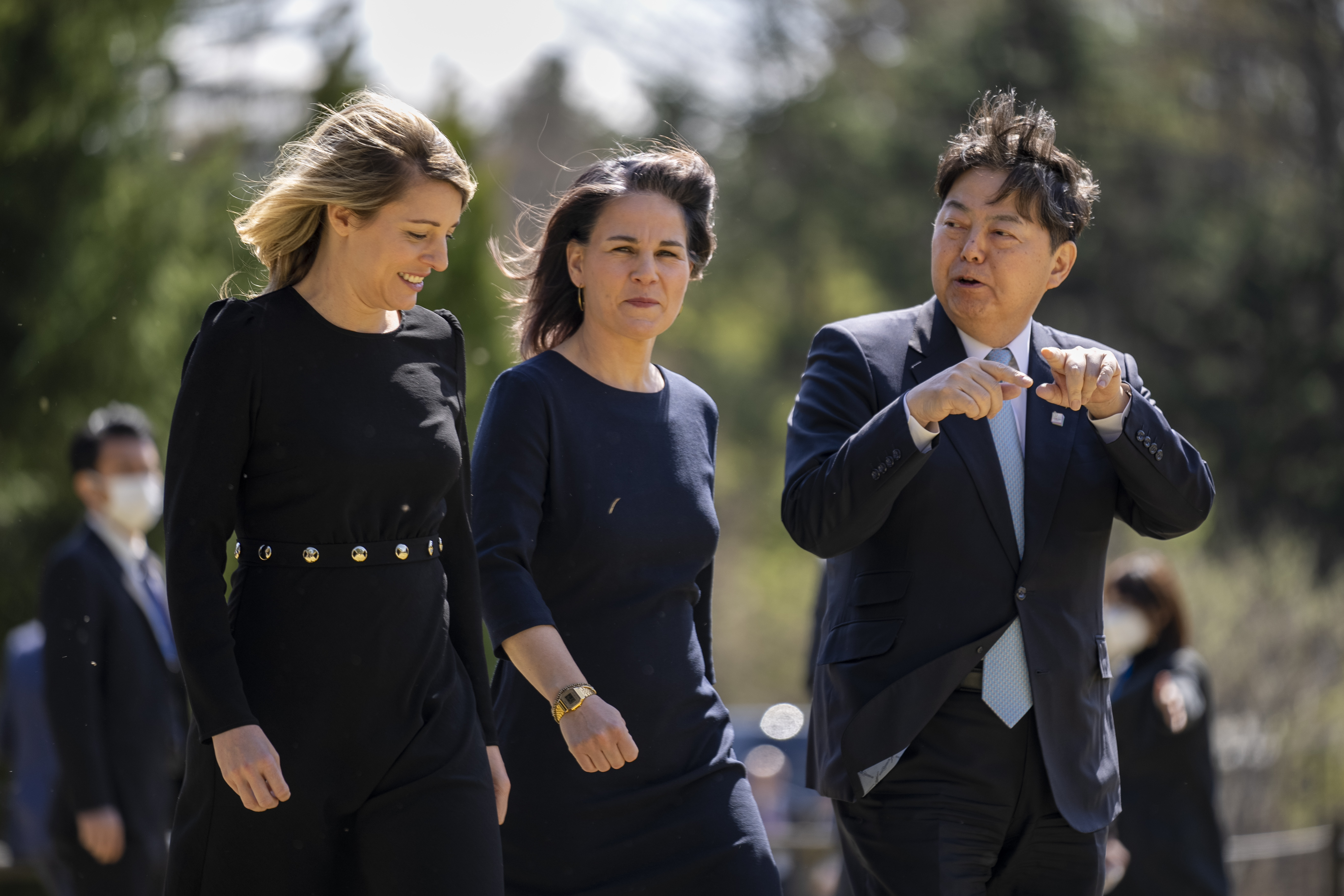
Russia’s war in Ukraine, China’s threats to Taiwan, and North Korea’s uncontrolled long-range missile tests will dominate the agenda today, Monday, as ambassadors from the seven most economically advanced democracies gather in a Japanese resort for a second day of talks designed to be the way G7 leaders act when they meet next month in Hiroshima.
Turning point for Ukraine
The world is at a “turning point” in the fighting in Ukraine and must “strongly reject Russia’s unilateral attempts to change the status quo through violence and aggression against Ukraine and its nuclear threats,” Japanese Foreign Minister Yoshimasa Hayashi said. to their colleagues, the Japanese side said in a statement.
For the US delegation, the meeting comes at a critical time for the international community’s response to Russia’s invasion of Ukraine and efforts to counter China, on two issues that G7 ministers – Japan, the US, the UK, France, Germany, Canada, Italy and the EU – see. serious challenges to the post-World War II rules-based international order.
A senior U.S. official who was on a trip with the U.S. Secretary of State told reporters that the goal of the Biden administration’s talks is to support Ukraine, which includes major initiatives on the country’s energy infrastructure launched at last year’s G7 summits in Germany, as well as ensuring the continuation of military aid to Kiev.
Accelerating Russia’s isolation, in particular through economic and financial sanctions, which the G7 first threatened in December 2021, ahead of the invasion, would also be a priority, the official said.
Ukraine will face a major moment in the coming weeks as Moscow’s current offensive is largely halted and Kyiv is preparing a counteroffensive. A US official, who spoke on condition of anonymity to discuss Blinken’s priorities in closed-door meetings, said ways to deepen support for Ukraine’s long-term defense and deterrence capabilities would be discussed. It could also improve Kyiv’s position for possible negotiations that could end the conflict on its own terms.
Coordinated Action for China

The role of Japan – the only Asian member of the G7 – as chair of this year’s talks provides an opportunity to discuss concerted action on China.
G7 leaders and foreign ministers, most recently France and Germany, have completed visits to China, and diplomats are expected to discuss their impressions of China’s position on a range of issues, including the war in Ukraine, at the Karuizawa resort.
Also on the agenda are North Korea and Taiwan, a particularly sensitive issue in US-China relations.
At a private working dinner on Sunday evening, which was the first official meeting of diplomats, Hayashi suggested continuing dialogue with China on global issues in which Beijing’s involvement is considered critical.
Intertwined with those of wealthy democracies, China’s interests include global trade, finance, and climate change efforts.
Diplomats are also trying to combat China’s recent more assertive stance in Northeast Asia, where it threatens Taiwan, the self-governing republic of which Beijing considers it a part.
Hayashi told his colleagues that countries should continue to “build constructive and stable relations, as well as directly express concern and encourage China to act as a responsible member of the international community,” the statement said at a closed-door dinner.
China recently sent planes and ships to simulate encirclement of Taiwan. Beijing is also adding nuclear warheads, taking a tougher stance on its claims in the South China Sea as it plans for an inevitable confrontation.
Japan’s preoccupation can be seen in its efforts in recent years to overcome its pacifist, purely defensive principles as they were defined after World War II. Tokyo is moving towards acquiring pre-emptive strike capabilities and cruise missiles to counter growing threats in the wider region.
US Secretary of State Anthony Blinken was due to visit Beijing in February, but the trip was postponed due to an incident with a Chinese spy balloon in US airspace, and a new visit has not yet been rescheduled.
Blinken briefly met with top Chinese diplomat Wang Yi on the sidelines of the Munich Security Forum, but high-level contacts between Washington and Beijing have become rare. According to a senior US official, Blinken will be asking his French and German counterparts for information about their interactions with the Chinese.
Despite indications, especially from French President Emmanuel Macron’s comments, that the G7 is divided over China, a US official said the seven countries share concerns about China’s actions, adding that foreign ministers will discuss how they will continue their coordinated approach. to China. .
“Headache” of North Korea

North Korea is also a key concern for Japan and other neighbors in the region.
Since last year, Pyongyang has launched about 100 missiles, including intercontinental ballistic missiles with a proven ability to reach the US mainland, as well as a number of other shorter-range weapons that threaten South Korea and Japan.
Japan’s foreign minister “expressed grave concern over North Korea’s ballistic missile launches at unprecedented frequency and in unprecedented ways, including last week’s launch, and G7 foreign ministers strongly condemned North Korea’s repeated ballistic missile launches in Korea,” as announced by the Japanese side .
Source: Associated Press.
Source: Kathimerini
Anna White is a journalist at 247 News Reel, where she writes on world news and current events. She is known for her insightful analysis and compelling storytelling. Anna’s articles have been widely read and shared, earning her a reputation as a talented and respected journalist. She delivers in-depth and accurate understanding of the world’s most pressing issues.